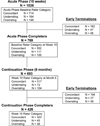Concordance between clinician and patient ratings as predictors of response, remission, and recurrence in major depressive disorder
- PMID: 20537348
- PMCID: PMC3677164
- DOI: 10.1016/j.jpsychires.2010.04.032
Concordance between clinician and patient ratings as predictors of response, remission, and recurrence in major depressive disorder
Abstract
We conducted a secondary analysis of data from the Prevention of Recurrent Episodes of Depression With Venlafaxine Extended Release (ER) for Two Years (PREVENT) trial to evaluate whether discrepancies between clinician and patient ratings of depression severity were predictive of response, remission, and recurrence during treatment for a depressive episode. Patients who self-rated depression severity in concordance with the clinician ("concordant patients") were defined as having a standardized patient-rated Inventory of Depressive Symptoms-Self Report (IDS-SR₃₀) score minus standardized clinician-rated Hamilton Rating Scale for Depression (HAM-D₁₇) score <1 SD from mean. Non-concordant patients ("underrating patients" [-1 SD], "overrating patients" [+1 SD]) were identified. Cohorts were compared for remission and response on the HAM-D₁₇, Clinician Global Impression--Severity (CGI-S), and IDS-SR₃₀ during acute and continuation therapy and time to recurrence during maintenance therapy. During acute treatment female patients were more likely to overrate their depression severity compared to the clinician; older age predicted overrating during continuation treatment. Overrating patients had a slower onset of response on the HAM-D₁₇ during acute treatment (P=0.004). There were no differences between cohorts for remission or response on the HAM-D₁₇ or CGI-S. Overrating patients at week 10 had lower remission and response rates on the IDS-SR₃₀ during continuation therapy (32% and 50%, respectively; P≤0.001) compared with underrating patients (76%, 77%) or concordant patients (64%, 78%). Patient concordance at the end of continuation therapy did not predict recurrence during maintenance therapy, indicating that patient rating scales may be useful in tracking recurrence during maintenance therapy. Poor agreement between patient- and clinician-ratings of depression severity is primarily a state phenomenon, although it is trait-like for some patients.
Copyright © 2010 Elsevier Ltd. All rights reserved.
Conflict of interest statement
Dr. Rothschild received grants or funding from the National Institute of Mental Health, Cyberonics, Takeda, and Wyeth. He is a consultant for Pfizer, GlaxoSmithKline, Forest Laboratories, and Eli Lilly & Company. Royalties include the Rothschild Scale for Anti-depressant Tachyphylaxis (RSAT), Clinical Manual for the Diagnosis and Treatment of Psychotic Depression, American Psychiatric Press, 2009.
Dr. Dunlop has served as a consultant for Wyeth and Bristol-Myers Squibb and has served on the Speaker’s Bureau for Bristol-Myers Squibb. He has received research support from GlaxoSmithKline, Novartis, Takeda, the National Institute of Mental Health, Ono Pharmaceuticals, and Wyeth.
Dr. Friedman is a consultant for Pfizer. He has received grant/research support from Northstar, Sanofi Aventis, Novartis, Cyberonics, Medtronics, and the National Institute of Mental Health.
Dr. Kornstein has received grants/research from the National Institute of Mental Health, Departments of Health and Human Services, Pfizer, Bristol-Myers Squibb, Eli Lilly & Company, Forest Laboratories, Wyeth, Novartis, Sepracor, Boehringer-Ingelheim, Sanofi-Synthelabo, AstraZeneca, and Takeda. She has served on advisory boards for Wyeth, Pfizer, Eli Lilly & Company, Bristol-Myers Squibb, Endo, Forest Laboratories, Sepracor, Neurocrine, and Takeda, and has received book royalties from Guilford Press.
Dr. Trivedi has received grants/research from the Agency for Healthcare Research and Quality, Corcept Therapeutics, Cyberonics, Meade Johnson, National Alliance for Research in Schizophrenia and Depression, the National Institute of Mental Health, NIDA, Novartis, Pharmacia & Upjohn, Solvay, and Targacept. He is a consultant for Abbott, Abdi Brahim, Akso, AstraZeneca, Bristol-Myers Squibb, Cephalon, Fabre-Kramer, Forest Laboratories, GlaxoSmithKline, Janssen, Johnson & Johnson, Eli Lilly & Company, Meade Johnson, Neuronetics, Parke-Davis, Pfizer, Sepracor, and Vantage Point.
Dr. Ninan is a Wyeth employee and stockholder.
Dr. Li is a Wyeth employee and stockholder.
Dr. Pedersen is a Wyeth employee and stockholder.
Dr. Keller is a consultant for Abbott, CENEREX, Cephalon, Cupress Bioscience, Cyberonics, Forest Laboratories, Janssen, JDS, Medtronic, Organon, Novartis, Pfizer, Roche, Solvay, and Wyeth. He has received grants/research from Pfizer and is part of the advisory board for Abbott, Bristol-Myers Squibb, CENEREX, Cyberonics, Cypress, Forest Laboratories, Janssen, Neurotics, Novartis, Organon, and Pfizer.
Figures
References
-
- American Psychiatric Association. Diagnostic and statistical manual of mental disorders. 4th ed. Washington, DC: American Psychiatric Association;
-
- Corruble E, Legrand JM, Zvenigorowski H, Duret C, Guelfi JD. Concordance between self-report and clinician’s assessment of depression. Journal of Psychiatric Research. 1999;33:457–465. - PubMed
-
- Domken M, Scott J, Kelly P. What factors predict discrepancies between self and observer ratings of depression? Journal of Affective Disorders. 1994;31:253–259. - PubMed
Publication types
MeSH terms
Grants and funding
LinkOut - more resources
Full Text Sources




